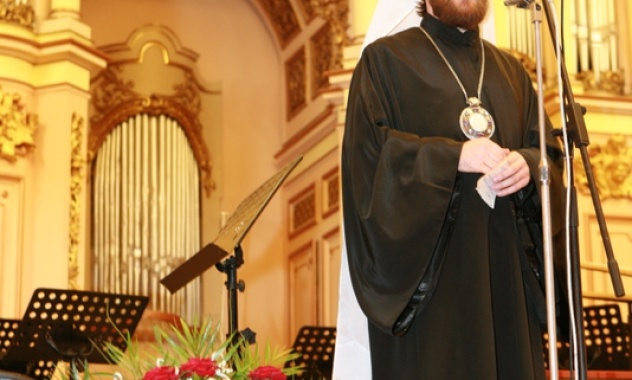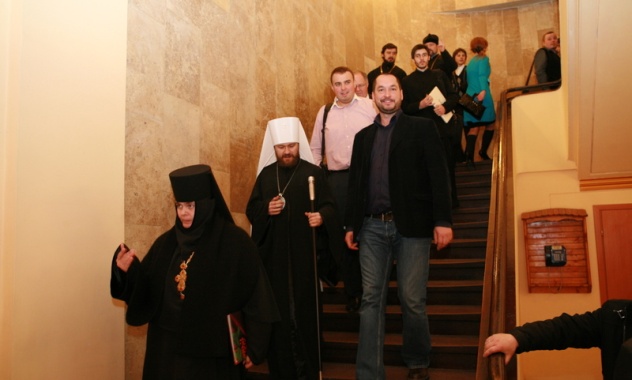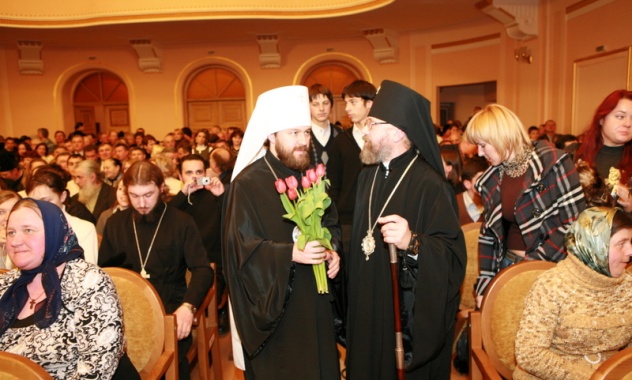Metropolitan Hilarion meets with public at Lvov Philharmonic Society
Passions According to St. Matthews composed by Metropolitan Hilarion, head of the Moscow Patriarchate’s department for external church relations, was performed at the Lvov Philharmonic Society during the metropolitan’s second day in Lvov, on 22 March 2010. The audience included Archbishop Augustine of Lvov and Galicia, the diocesan clergy and laity, representatives of various religious communities in Lvov, regional and municipal officials as well as public and cultural figures. Sister Seraphima Shevchik, chair of the Ukrainian Orthodox Church’s mission and culture department made introductory remarks, emphasizing the special significance of a composition devoted to Christ’s passions being performed on the eve of the Holy Week.
After the recital Metropolitan Hilarion addressed the audience, saying:
Lent is now drawing to an end and the Holy Week will begin in a few days when we together with the whole Church will go through our Lord Jesus Christ’s last days on earth. This is a story told by the four Evangelists and it is this story that I wanted to tell through my music you have just heard. This story concerns the life of every one, as every one of us can recognize oneself and one’s world – the world in which we live in this story. We hear from the Gospel how people conducted themselves, how the closest disciples of Christ scattered out of fear when a moment of trial came. Peter, the first of the disciples, repudiated the Saviour. We can see how the crowd, who only a few days ago welcomed Jesus Christ with cries ‘Hosanna to the Son of David!’ now shouted ‘Crucify him!’ This is a story about human betrayal, human weakness, and human perfidy. But shining forth for us throughout this story is the divine image of our Lord the Saviour and the good which He brought to the world and which outshines any human malice or human darkness.
It is not accidental that the Orthodox liturgical texts speak about not only the death and passions of Christ but continuously about the Resurrection of Christ as well. The passions and death are intimately bound up with the Resurrection. There can be no Resurrection without suffering and death. The Lord Jesus Christ descended into human darkness, the darkness of human life, to penetrate it with His divine light. The Lord Jesus Christ descended to our earth to live among us, to live amidst our sinful human family. He did not shun our weakness in order to make us spiritually strong. The human person of Christ is the ideal which should be sought by all people. It is the universal ideal to be emulated and followed by everyone so that one could come closer to goodness and light.
On the Gospel’s pages we see a battle going on between good and evil. It is a conflict in which good triumphs because Christ triumphs. He came to the earth to save the fallen Adam, but failing to find him on earth, He descended into hell to find him there. The fallen Adam are we all and every one of us. The Lord Jesus Christ came not to an abstract human mass, he came to each of us. His message is addressed to each of us. This is why the story about the passions and death of Christ is both universal and personal.
What did Jesus Christ leave behind? What did He leave on the earth? He has left not only His teaching, not only his words recorded in the Gospel. In the first place, He has left here His Church about which He said that the gates of hell will not overpower it. It is the Church made up of sinful people, just like those who were around our Saviour during His Last days on earth. But the Church is a community of people in which everyone can relate to Christ and encounter Him face to face. It is a church community in which people, while uniting with God, come to be united with one another by very special bonds of spiritual kinship.
It happens when we partake of the holy Mysteries of Christ. We can hear in the Gospel how Jesus Christ gathered His disciples together before His death and offered them the Bread and the Cup and said: Take, eat; this is my body… Drink ye all of it; For this is my blood of the new testament, which is shed for many for the remission of sins (Mt 26:26-28). The blood of Jesus Christ shed for each of us has united us in one body – one Church. And this is why it is so important to be in the Church. This is why the Church is that saving boat which take us all to the Heavenly Kingdom. In the Church we unite with Christ not only spiritually but also physically as His Body becomes our body, His Blood comes to run through our veins. This is why it is so important to consolidate the unity of the Church. This is why it is so painful for us to see divisions and conflicts existing between Christians.
Like soldiers who tore the robe of Christ and mocked at Him, those who bring division in the Church tear this holy robe. Therefore the task for us all is to consolidate the unity, work for unity and pray for unity. We cannot achieve this unity through human effort alone but we can pray for it and show our good will, making steps toward each other. There nothing impossible for God. What people have divided can be re-united by the power of God’s grace.
In this remarkable city in which the believing people live, who cherish Christ and the story of His passions and death, I would like to express the wish that the words ‘that all may be one’ (Jn. 17:21) Christ said in His prayer before His death may be fulfilled. May this miracle of the reunification of what was dissolved and destroyed through human efforts be accomplished and may God give us to become witnesses to this miracle during our lifetime.
Then the DECR chairman answered questions from the audience. Asked about the meaning and prospects of interconfessional dialogue, he said:
Dialogue is necessary because we should stay together. In order to understand what divided us we should explain this to each other, we should discuss it. Without dialogue it will be very difficult to find a way to unity. Therefore, without doctrinal compromises and betrayal of our faith, we should meet with people separated from us by history, some human factors and perhaps certain theological differences. We should talk to them so that all may be brought to the God-commanded unity.
Metropolitan Hilarion was asked about possible ways of uniting Christians in Ukraine. Answering this question His Eminence said in particular:
Ukraine is a beautiful country, a country with a long history, and this history is inseparable from the history of her neighbours – Russia and Belarus. Today these countries are divided by political borders but we share the same spiritual heritage, the same spiritual community which goes back to the baptismal font of St. Vladimir Equal-to-the-Apostles. Coming to Ukraine, even to western Ukraine, we, Russians, do not feel foreigners here. It is different from coming to France or America. I believe we are united first of all by the heritage of Orthodox faith.
It is impossible to speak now of some way in which all Christian confessions in Ukraine can unite right away. It is a utopia. This utopian idea was pursued by the politicians who have had recently to step down. First of all it is necessary to cover the way of uniting the body of one catholic Orthodox Church in Ukraine which has happened to be divided. This is a difficult process. It requires courage, openness and patient dialogue. The most important thing is a wish to live in unity, which stands above all the political slogans used by national or ethnic branches.
As far as unity between the Orthodox and the Catholics is concerned, it would probably be much more difficult to achieve this goal, but we have to work for it because essentially the Orthodox Church and the Catholic Church are the Churches which have apostolic continuity… It is a different matter that we do not share the sacramental communion for well-known historical reasons.
I believe the task of every Christian, not only hierarchs and those responsible in the Church for inter-Orthodox and inter-Christian relations, is to work for church unity. Once again I would like to say: it is impossible to achieve through human efforts, but there is nothing impossible for God.
Then the metropolitan’s talk with the audience moved to the liberal ideology imposed on people in some Western countries.
In Europe today the liberal ideology has prevailed, or rather has been imposed on people, whereby the individual with all his sinful passions and weaknesses is the measure of all things, as the ancient Greeks used to say. According to this ideology, there is no moral norm, nor God’s commandments to be followed by people. There is only human freedom and the right to choose a way of life and a scale of moral values according to which the individual will live. Human freedom is believed to be an absolute good, while traditional values on which human life was built for centuries are subjected to obstruction and mockery and believed to be antiquated. And when we, church people, polemisize with adherents of this liberal and essentially atheistic worldview, it is not a theological polemic, as we do not argue whether God exists or not. Our polemic is rather about values of human life, the spiritual and moral values on which human life is built.
When one gives priority to success, material wealth and career, one tends to forget about fundamental values, such as family, bearing and raising up children. People tend to place material wealth to the forefront. Its list is to include a good job, high salary, good apartment, car, while a child is put to the fifth or eighth place in this scale, one child at that. One child is normally sufficient for a family couple to feel satisfied and well-off.
And if we look at what the Church teaches we will see that it is family that should occupy the first place, with marital loyalty, bearing children – not one or two but as many as the Lord will send. This is what human life was built on for centuries. And as long as people observed God’s commandments, as long as they saw in family something sacred and unshakable and saw in children a blessing of God, humanity developed and multiplied. And what we see now? Whole nations are gradually diminishing. If before two people could have eight children and twenty eight grandchildren, now ten married couples would have ten children, five grandchildren and two grand grandchildren. This is what we can see. Therefore the point is simply the survival of humanity, the survival of the nations which have embarked on the path of liberal worldview and rejected fundamental Christian religious values.
In the evening, Archbishop Augustine gave dinner in hounor of Metropolitan Hilarion. Among the guests were Roman Catholic Archbishop Mechislav Mokshitsky and Bishops Leon Maly and Markian Trofimyak.
In conclusion of the repast, Metropolitan warmly thanked Archbishop Augustine and all those present for the warm welcome and hospitality.
DECR Communication Service


















